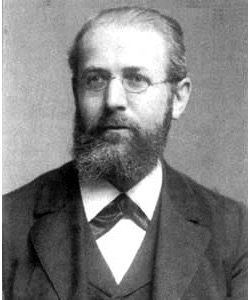
May 1, 2019
Speaker: Érik Amorim
Title: Quantum Mechanics and Representation Theory of Position and Momentum
Abstract: This talk will pick up on topics from the previous talk by Parker Hund on representations of the Heisenberg group and algebra (with brief recaps whenever appopriate), this time with an emphasis on the Physics side of the topic. The goal is to show how unitary representations of Lie groups and algebras arise from the postulates of quantum mechanics, and how Groenewald's no-go theorem is a limitation on the physicist's naive idea of quantization of classical observables.
April 24, 2019
Speaker: Parker Hund
Title: The Heisenberg
Abstract: This is the first of two talks on some connections between physics and algebra. I will discuss the Heisenberg group and algebra and their representations. Then I will discuss the connections between classical mechanics, symplectic geometry, and the Heisenberg group.
April 17, 2019
Speaker: Alejandro Ginory
Title: Another Proof of Modular Invariance
Abstract: A very important result in the representation theory of affine Lie algebras is that the space spanned by the (properly normalized) characters of integrable highest weight modules is invariant under the action of certain congruence subgroups of SL(2,Z). Most proofs involve expressing the characters explicitly in terms of functions with modular invariance properties like theta functions, Eisenstein series, and Weierstrass P-functions. In this talk, we will discuss a method of proving modular invariance without resorting to expressing characters in terms of already known modular invariant function spaces. The proof will use a group presentation of the so-called double affine Weyl group.
April 10, 2019
Speaker: Weihong Xu
Title: Geometry of reductive groups: flag varieties
Abstract: I will try to give an accessible introduction to flag varieties G/P, where G is a complex semi-simple linear algebraic group and P a parabolic subgroup. In particular, I will talk about cohomology and give examples of applications to enumerative geometry, although many proof details will be skipped.
Bruhat decomposition of reductive linear algebraic groups gives a “cellular decomposition” of the flag variety G/B (where B is a Borel subgroup of G) by Schubert cells. It follows that Schubert classes form an additive basis of H*(G/B). The "Giambelli formula" relates Schubert classes with generators of the cohomology ring. Applications to enumerative geometry arises from the geometric interpretation of cup products as intersections.
April 3, 2019
Speaker: Luochen Zhao
Title: Structure theorem for reductive groups (absolute theory), I
Abstract: This talk is motivated by the speaker’s intention to understand reductive groups, so is supposed to be accessible for a wider audience, the modest goal being to introduce the notion of reductive groups over an algebraically closed field, the secondary being to state their structure theorem, known also as the isomorphism & existence theorem. In particular I want to explain Grothendieck’s vision of pinned reductive groups.
The talk is planned to cover the following: -some motivation, historical (après Chevalley) and representation theoretic (“Rep(G) is semisimple”); -basics of linear algebraic groups over algebraically closed fields, some comments on the deficiency; -the formal definition of reductive groups, and the associated root datum; -the statement of the structure theorem; -examples.
The interested should be cautioned that little or no proof will be given.
Mar. 27, 2019
Speaker: Edna Jones
Title: Modular Forms and Hecke Operators
Abstract: I will give a brief overview of modular forms and Hecke operators and explain one of the reasons why we care about them.
Mar. 13, 2019
Speaker: Songhao Zhu
Title: An Easy Introduction to Jordan Algebras
Abstract: Jordan algebras interest people in various ways. I will give the definition, some examples and the classification of the formally real Jordan algebras. After a brief review of Lie algebras, I will discuss the connection between Lie algebras and Jordan algebras using Tits' construction with computations in specific cases.
Feb. 27, 2019
Speaker: George Hauser
Title: The Basics of Modular Forms
Abstract: Modular forms are ubiquitous in various areas of math, including number theory and representation theory. In this talk I will present the basic theory of modular forms. Although this talk will not get into the connections to representation theory, it will provide a background for future talks that go into the deeper aspects of the subject.